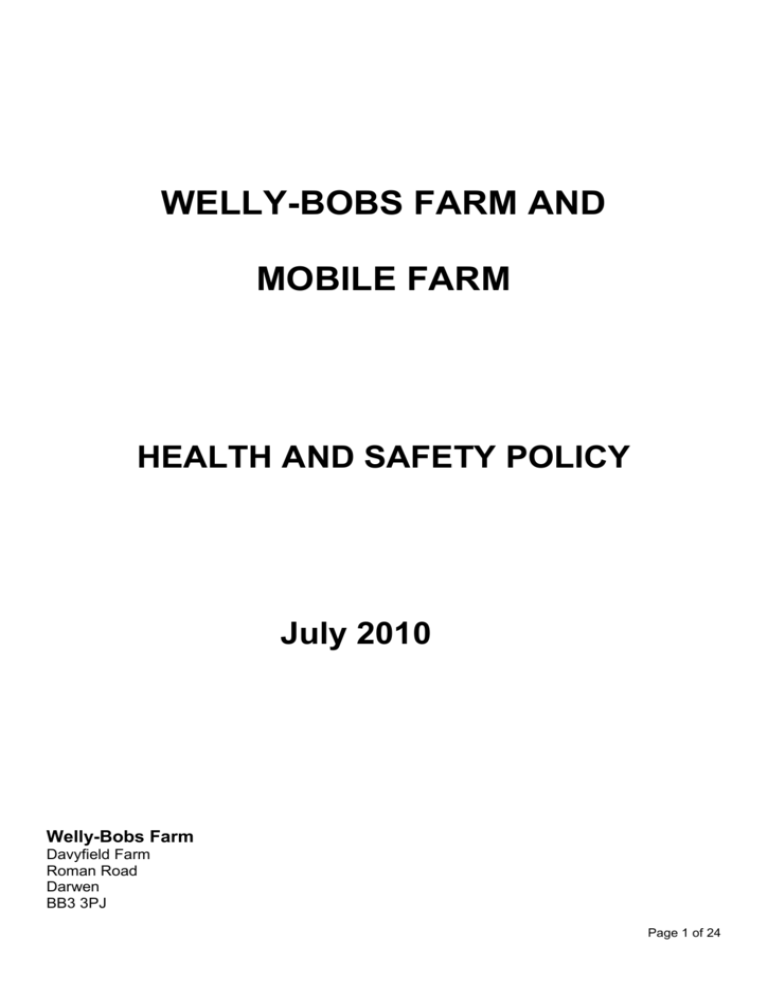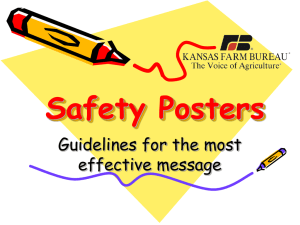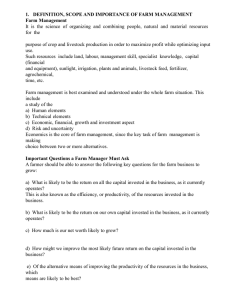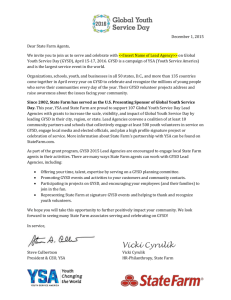Health and Safety Policy
advertisement

WELLY-BOBS FARM AND MOBILE FARM HEALTH AND SAFETY POLICY July 2010 Welly-Bobs Farm Davyfield Farm Roman Road Darwen BB3 3PJ Page 1 of 24 TABLE OF CONTENTS Safety Policy 4 Summary Of Arrangements 6 Brief Provisions Of Health And Safety At Work Act 7 Organisation 8 Organisation Chart 8 Senior Company Director 9 Directors 9 All Employees 10 Health And Safety Consultant 11 Communication 11 Training 11 Management Of Safety 12 Risk Assessment 12 Safe Systems Of Work 12 Health and Welfare Facilities 12 Accident Reporting And Investigation 12 Reporting of Absence due to sickness 13 Reporting of Injuries, Diseases and Dangerous Occurrences (RIDDOR) 13 First Aid Smoke Free Legislation 13 13 The Management Of Risk 14 Work Equipment 14 Portable Electrical Appliance Testing 14 Lifting Operations And Lifting Equipment 14 Working At Height 15 Workplace Transport Safety 15 Driving at Work 15 Use of Mobile Phones 15 Fire And Explosion 15 Electricity 16 The Management of Health Risks 17 Control Of Hazardous Substances Hazardous To Health 17 Display Screen Equipment 17 Noise and Hearing 17 Page 2 of 24 Eyes and Eye Strain 18 Personal Protective Equipment (PPE) 18 Occupational Stress 18 Management of Asbestos Manual Handling 19 Health Surveillance 20 Alcohol and drug Abuse 20 Appendix I Additional Information 21 18 Page 3 of 24 Statement of Intent Safety Policy General It is the policy of Welly-Bobs Farm and Mobile Farm to attach the greatest importance to the health, safety and welfare at work of all its employees, its customer’s employees, contractors and members of the public who may be affected by the company’s activities. We are committed to meeting our responsibility under Health and Safety law as a minimum requirement and this will be achieved by: Welly Bobs will endeavour to eliminate any hazards which may result in personal injury, industrial illness, fire, security losses, property damage or harm to the environment. providing adequate resources including finance to control the health and safety risks arising from work activities; consulting with employees on matters affecting health and safety; providing and maintaining safe plant and equipment; ensuring safe handling and use of substances; providing information, induction, instruction and supervision for employees; ensuring all employees are competent to do their tasks; preventing accidents and cases of work-related ill health; reporting of accidents and investigation to prevent recurrence maintaining safe and healthy working conditions Provision and display of the evacuation procedure in the event of a fire Provision of First Aid Facilities Provision of safety or protective equipment and if appropriate health surveillance to all persons affected by their work where it is not possible to eliminate or minimise risks at source. Bring this policy to the attention of all employees Set objectives for continual improvement and review and revise this policy as necessary at regular intervals. Equally, it is the duty of each employee to co-operate with management in safety, health and welfare matters. Every employee is legally obliged to work as safely as possible and to avoid injury to themselves or others. Any employee having a problem should raise the matter with their Supervisor. Any employee who during the course of their work is required to visit premises, or a site other than their normal workplace, should be instructed to comply with the health and safety rules relating to those premises or sites. The Welly Bobs Health and Safety requirements are the minimum acceptable. Employees attention is drawn to Section 7 of the Health and Safety at Work Act 1974, which requires all employees to take reasonable care for their own health and safety, that of other employees and members of the public during the course of their work and co-operate with the Company in meeting its statutory obligations. Signed: Date Position: Proprietor Page 4 of 24 Summary of Arrangements As Welly-Bobs Farm and Mobile Farm policy is to provide a safe and healthy working environment we will ensure so far as is reasonably practicable: - That all members of staff are aware of their responsibilities covering Health and Safety at work (including EC Directives) That adequate and competent supervision is maintained to ensure the safe use, handling, transport and storage of plant, equipment and materials. That adequate supervision is maintained to ensure facilities are provided for the protection of the public. Periodic inspections are carried out on the condition of tools, plant, equipment, systems of work and work areas. The Safety Consultant will assist as required with advice and information on legal requirements. First Aid kits are provided for all vehicles and where applicable personnel are trained in Emergency First Aid. The Safety Consultant is available to all staff via email for advice on any matter relating to Health and Safety additional information is also available in Appendix I of this policy. The Proprietor consults on all matters concerning Health and Safety in staff meetings As provision is made for Health and Safety training, employees will be encouraged to attend these courses at a level to match their responsibilities. Fire fighting equipment is provided at all locations, including mobile units. Provision will be made for equipment to be available on any specific type of work that may be a fire hazard. All responsible people should familiarise themselves with the Health and Safety Regulations relevant to their operations. Accident report forms will be kept at all locations and all accidents will be recorded on the relevant Accident Report Forms. All reasonable steps will be taken to identify the cause of major accidents or dangerous occurrences by conducting an immediate investigation with a view to instant withdrawal from use of faulty plant or tools, or modification of the method of working should this be required to prevent a recurrence. Accident records and statistics will be maintained and trends discussed and analysed at the staff meetings. Suggestions by personnel on ways of making conditions safer are always welcome. Any suggestions should be discussed with the proprietor Page 5 of 24 BRIEF PROVISIONS OF HEALTH AND SAFETY AT WORK ACT AS THEY AFFECT THE COMPANY AND ITS STAFF Employer Must safeguard employees and others from harm arising from any type of work. Must control the ownership, storage and use of dangerous substances and emissions into the environment. Must provide the necessary information, instruction, training and supervision as is necessary to ensure the health and safety at work of employees. Must safeguard people working on company premises from risks to health and safety whilst entering, on, or leaving those premises. Employee Must take care of the health and safety of him and others who may be affected by his acts or omissions. Must help the employer and anyone else concerned to comply with the requirements of Health and Safety at Work Act 1974. An Inspector May issue an Improvement Notice (giving time for a breach of the Act to be put right) or a Prohibition Notice (requiring immediate or post dated cessation of a breach of the Act). IN EITHER CASE ACTION WOULD BE REQUIRED BY THE EMPLOYER AND EMPLOYEE WITHIN A TIGHT TIMESCALE SO IMMEDIATE CONTACT WITH THE DIRECTOR IN THESE CIRCUMSTANCES IS ESSENTIAL. In default both the employer and the employee can be prosecuted (maximum penalties unlimited fines and 2 years imprisonment). Page 6 of 24 Organisation Welly Bobs Farm and Mobile Farm Managing Director Heath Kershaw Director Financial Director Kathryn Kershaw Wendy Bowers Park Managers x2 Life Stock Manager Catering Manager Joanne Christine Karen Caroline Assistant Manager Mobile Farm Karen Homer Animal Based Staff x4 And additional part time staff Hospitality Staff x6 And additional part time staff X6 2 x part time workers Page 7 of 24 Managing Director Accepts his responsibility for the management and implementation of the Company’s Health and Safety Policy He and the staff of Welly Bobs comply with all the requirements of current Health and Safety legislation. All staff are aware of their responsibilities whilst at their designated place of work. Staff are provided with information, advice and training as necessary to fulfil their responsibilities. Periodic checks are undertaken to ascertain that safety practices and procedures are being implemented and adhered to. Adequate finance and other resources are available to rectify hazards that may exist. Liaison with a Health and Safety Consultant on health and safety issues. Ensure all accidents are investigated either by the Line Managers or the Health and Safety Consultant. All necessary inspections are carried out ON TIME. This will be achieved by: Ensuring that all work is planned, managed and monitored to ensure a safe and healthy working environment. Ensuring competent people are appointed and are provided with adequate training to allow them to carry out their duties safely and are clear about their responsibilities under health and safety legislation. Ensure a safe working environment, welfare, and systems of work as related to the Management of Health and Safety Workplace regulations and the management of Health and safety regulations. Communicating Health and Safety policy and procedures to all staff. Enforcing the Health and Safety policy and procedures and ensuring that appropriate disciplinary action is taken against transgressors Ensure a safe working environment, welfare, and systems of work as related to the Management of Health and Safety Workplace regulations and the management of Health and safety regulations Provide information by consulting with employees on matters concerning their Health and Safety Directors Accept responsibility for ensuring That their own work and that of their staff is planned, managed and monitored to ensure a safe and healthy working environment and to minimise the impact of the company’s activities on the environment. Competent people are appointed and are provided with adequate training including refresher training, information and instruction to allow them to carry out their duties safely and are clear about their responsibilities under health and safety legislation. Ensure a safe working environment, welfare, and systems of work as related to the Management of Health and Safety Workplace regulations and the management of Health and safety regulations Page 8 of 24 Managers Ensure full safety measures are taken in: * Current day-to-day working operations and activities. * Planning safe work methods. * Purchasing and use of equipment. Promote the Company’s Health and Safety Policy, know the entire safe operating procedures relative to their section and ensure that their subordinates know and carry out all safety requirements on a practical basis. Ensure that all investigations and reporting procedures are carried out on time, examine all accident reports relative to their section and take prompt steps to correct any unsafe conditions or acts which are noted or reported. Operate within all legal requirements relative to the work of their section. Ensure that regular safety checks are carried out on equipment and systems of work. Ensure that Risk Assessments, Method Statements and COSHH Assessments are carried out as required and are on site for inspection. Ensure that where possible manual lifting is avoided. Where manual handling is unavoidable ensure good lifting techniques are employed Ensure guards and safety equipment is in place and used where required. All staff use PPE when required and it is regularly inspected, maintained and replaced in a timely manner when required. Provide health and safety training via Tool Box Talks to site operatives on a weekly basis. Ensure good housekeeping on site. All welfare provisions are adequate and well maintained. Report any breaches of health and safety, defective equipment and obvious risks to the Contracts Manager immediately. Give full support to all safety activities organised by the Company. Check own competence Co-operate with and co-ordinate work so as to ensure the health and safety of employees and others who may be affected by the work All Employees Be familiar with and demonstrate their commitment to the implementation of the Policy. Take care of the health and safety of themselves and others who may be affected by their acts or omissions. Cooperate with the organisation in its pursuit of continuous improvements of its health and safety performance. Behave responsibly and work safely at all times, without risks to health. Carry out their duties and tasks in accordance with the requirements of this Policy. Comply with all instructions given and to the site signage and notices. Page 9 of 24 Only use equipment for which they have been suitably trained, and only for the purpose it was intended. Report any breaches of health and safety, defective equipment and obvious risks to the Managing Director immediately. Work within the requirements laid down in the induction and respective Method Statement and Risk Assessments and will refrain from horseplay, at all times. Report ALL accidents and near misses to the Director. Wear required PPE at all times. Report the loss or damage of PPE and immediately and obtain replacements. Store PPE in the designated place Assist in maintaining welfare facilities in a clean and tidy condition. Maintain a check on ones own competence and undertake regular training and refresher training on Health and Safety and other responsibilities Give full support to the company’s Health and Safety Adviser. Co-operate with others on site and co-ordinate work so as to ensure the health and safety of workers and others who may be affected by the work Health and Safety Consultant Is available to advise and assist all Welly-Bobs Farm and Mobile Farm personnel on all matters of accident prevention and the implementation of the Safety Policy. He/she will help to achieve a high standard of safety performance throughout the Company by: Assisting Welly Bobs in promoting and maintaining control. Keeping abreast of, and advising on compliance with, all legislation applicable to persons at works covering fire, safety, health and welfare. Advising on codes of practice and safe systems of work and assisting as required, in the preparation of such standards. Investigating all serious accidents or dangerous occurrences reportable to the Health and Safety Executive. Advising on health and safety aspects of new plant, equipment and protective clothing. Advise on safe working procedure, produce site report forms and provide health and safety support. Communication Consulting Employees on Health and Safety In accordance with the Health and Safety (Consultation with Employees) Regulations 1996, we will consult all of our employees in good time on health and safety matter, such as: Any change that may substantially affect their health and safety at work e.g. The employer’s arrangements for choosing competent people to help him to satisfy health and safety legislation The information that employees must be given on the likely risks and dangers arising from their work, such as electricity and the risk from VDU. The planning of health and safety training. The health and safety consequences of introducing new technology and equipment Page 10 of 24 Employees suggestions for improvement in the management of Health and Safety Refresher training and re-enforcing training In practical terms this is achieved through the daily contact the director has with employees. Training Relevant legislation Training requirements are identified in many acts and regulations. In accordance with this legislation we will ensure that all employees have induction training, specific on the job training and adequate health and safety training. Page 11 of 24 Management of Safety Management of Health and Safety at Work Regulations 1999 Risk Assessment The Senior Company Director will ensure that risk assessments are carried out by competent personnel for work activities in accordance with The Management of Health & Safety at Work Regulations 1999 and other relevant regulations. The risk assessments will be recorded on the standard assessment forms provided and will follow the following broad outline 1. What are the hazards, which could hurt people on the proposed work? 2. Who would be at risk? 3. When would they be at risk? 4. How serious an injury could result? 5. How can the possibility of this accident happening be eliminated or at least reduced and controlled The results of the risk assessments will then be incorporated into safe systems or work, which will be explained to the staff and implemented by them. Safe Systems of Work It is our policy to ensure, so far as is reasonably practicable, that all required tasks can be carried out with the minimum of risk to our employees and others who may be affected by our activities. Where it is highlighted, either by a formal risk assessment or by other means, that some unacceptable residual risk remains and can only be further controlled by the use of a safe system of work. Such a system of work will be devised and all affected employees will be instructed in its application. All employees are required to follow the relevant safe system of work. Health and Welfare Facilities Under the Workplace (health, Safety and Welfare) Regulations 1992 particular requirements for most aspects of the working environment are laid down. Welly-Bobs Farm and Mobile Farm will meet these requirements through the proper control of the environment. It is the policy of WellyBobs Farm and Mobile Farm to provide an environment which does not contribute to any ill health effects and specifically includes the provision of portable hand basins and disinfectant hand gels to significantly reduce the risk of infection from contact with the animals. Accident Reporting and Investigation It is the policy of Welly-Bobs Farm and Mobile Farm that all accidents and incidents are reported in the accident book. The main objective of accident reports and investigation is to enable accidents to be prevented. A study in circumstances will help remove the causes. The Accident Investigation Every Accident should be investigated and the outcome of the investigation recorded on the Accident Investigation Report form. In every investigation there are certain basic facts which must be obtained, name, sex, occupation, etc., but in order to determine the cause of the accident nothing should be altered or removed from the scene, unless it is necessary for safety purposes until investigations are complete. Investigation of dangerous occurrences must not be neglected, as there are also accidents even though no visible injury is evident. Page 12 of 24 Accident Book All accidents, no matter how small, must be reported to your supervisor as soon as possible who will enter the said accident in the accident book. The completed form will be passed to the Heath Kershaw without delay. All accidents and near misses should be investigated and where necessary reported to the Health and Safety Executive. If requested the Health and Safety advisor can help with this Reporting of Absence due to sickness It is essential that all employees inform their Manager of all illnesses resulting in time off work and in particular any which they regard as work related. Reporting of Injuries, Diseases and Dangerous Occurrences (RIDDOR) Any serious accidents should be reported to the appropriate enforcement agency on form F2508, directly to the RIDDOR incident centre by telephone (0845 300 9923, fax 0845 300 9924) or on line at http://www.riddor.gov.uk as soon as possible. First Aid A first aid box will be provided, the contents of which must be adequate for the total numbers employed. Each first aid box is suitably marked and s easily accessible to all employees at all times when they are at work. They should only contain first aid requisites sufficient for the numbers employed and in accordance with the regulations. (The contents list can usually be found inside the lid of the box.) The first aid box should preferably be kept in a prominent location that is readily accessible, and free from dust. There will be at least one 'appointed person" available at all times an 'appointed person' is a person recognised and instructed by the Company to take charge of the situation (e.g. to call an ambulance) if a serious injury or major illness occurs on site. This will normally be Heath Kershaw who will also be responsible for maintaining and replenishing the first aid box. It will be the duty of Heath Kershaw to enrol a further ‘appointed person’ from the senior members of his/her workforce to ensure that, during his/her absence from site someone is always available to take charge of any such situation and that this person has been suitably instructed regarding contacting the local hospital/ ambulance service etc. Emergency first aid training be considered for all ‘appointed persons’ as a minimum requirement, this should include resuscitation, control of bleeding and the treatment of an unconscious person etc. Smoke Free Legislation On the 1st July 2007 the UK smoke free legislation came into effect. This rendered all enclosed public places which include places of work smoke free. The definition of an enclosed space is one that is enclosed for more than 50% of its potential wall area. There are some exceptions to this but they are very limited. The company will display smoking signs as required by the law. All employees are expected to abide by the legislation as a minimum and the policy of the employing company if it places greater controls on smoking. Failure to do so will result in an investigation under the company disciplinary procedure and may result in disciplinary Action. Page 13 of 24 The Management of Risk Work Equipment The Provision and Use of Work Equipment Regulations 1998 The Lifting Operations and Lifting Equipment Regulations 1998 So as to comply with the above Regulations, Heath Kershaw will ensure: All employees are trained in the use of equipment they are expected to use. Regular maintenance inspections are carried out on all equipment and records are kept on the form provided. All equipment is kept in good order. No person uses faulty equipment or equipment that does not have relevant safety devices fitted. Employees will report faulty or dangerous equipment. Portable Electrical Appliances Pre use visual inspection check lists are completed for all portable electrical equipment used when displaying animals. Testing Electrical appliances, inclusive of cables and plugs, which come into scope for frequent testing, include portable 110-volt equipment, computers, photocopiers, fax machines, mobile telephone charging units, together with, domestic equipment used in company offices, such as vacuum cleaners, microwave ovens and kettles must all be tested at regular intervals as specified by the competent tester and shown in the records A record must be kept in the main office of: 1. A list of appliances eligible for testing. 2. An entry date alongside each appliances of when it was last tested. Lifting Operations and Lifting Equipment The Lifting Operations and Lifting Equipment Regulations 1998 Welly-Bobs Farm and Mobile Farm do not currently own and is not responsible for equipment which is controlled under the Lifting Operations and Lifting Equipment Regulations 1998. Statutory inspection certificates for hired equipment should be checked prior to use. Working at Height Welly-Bobs Farm and Mobile Farm will do all that is reasonably practicable to prevent and in order to comply with the Work at Height Regulations 2005. Welly-Bobs Farm and Mobile Farm will ensure that any work at height is properly planned and organised including risk assessments. Page 14 of 24 Workplace Transport Safety The company will ensure that vehicle movements at the workplace and activities such as loading and unloading are carried out safely. It applies to any vehicle or piece of mobile equipment which is used by employers, employees, self-employed people or visitors in any work setting (apart from travelling on public roads). . The company will carry out a risk assessment’ of its transport system to identify danger and the cause of danger. For example: People being struck by vehicles because they are not segregated, or due to blind bends. These risk assessments will be reviewed annually. Driving at Work Recent changes in standards relating to ‘business travel’ have placed greater responsibility on the employer for the safety and welfare of those who travel, particularly those engaged in work-related driving. Driving is one of the most dangerous work activities that most people undertake It is not enough just for employers to comply with traffic law requirements e.g. valid MOT certificates risks from on the road activities need to be effectively managed within a health and safety management system. Welly-Bobs Farm and Mobile Farm will meet these responsibilities through the application of the company driving policy. Use of Mobile Phones It is both law & policy of the organization that no employee uses a hand held mobile phone whilst driving any vehicle whilst on duty. In order to ensure the Health & Safety of all concerned, disciplinary action will be taken against any employee found to be in breach of this. Fire and Explosion It is the policy of Welly-Bobs Farm and Mobile Farm that we comply as a minimum to the requirements of the Regulatory Reform (Fire Safety) Order 2006. We will ensure that: A fire risk assessment is conducted of our premises and regularly reviewed. The Senior Director recognizes his role as the responsible person at Welly-Bobs Farm and Mobile Farm and has delegated the responsibility for day to day control of on site fire safety systems to Cath Bullock. A competent person with sufficient training and experience assists with the preventative and protective measures. Employees will be provided with adequate safety training; o At induction o When the risk changes o Periodically throughout employment to refresh knowledge Information will be provided to contractors, employees and visitors regarding; o Dangerous substances other than where the risk is very low (this information will also be provided to the fire authority) o Emergency arrangements o General arrangements for fire safety Everyone knows what to do in case of fire. Display clear instructions and have a fire drill periodically; Page 15 of 24 People know how to raise the alarm and use the extinguishers. Arrangements are in place for calling the fire brigade to any suspected outbreak of fire; Enough exits are provided for everyone to get out easily; Clearly marked and unobstructed fire doors/escape routes are provided Fire escape doors can be opened easily from the inside whenever anyone is on the premises Fire doors are never wedged open - they are there to stop smoke and flames spreading; If a wall is meant to be fire-resisting, it has no holes or gaps (e.g. around pipe work) and the wall continues above any false ceiling; Fire alarms are regularly checked to ensure they work and can be heard everywhere over normal background noise? Enough fire extinguishers are provided and are of the right type (and properly serviced) to deal promptly with small outbreaks. Electricity Welly-Bobs Farm and Mobile Farm will take action required to meet The Electricity at Work Regulations 1989 requires precautions to be taken against the risk of death or injury from electricity at work. Electricity can kill, even at normal mains voltage (240V). Each year many accidents at work involving electric shock or burns are reported to HSE, and contribute substantially to the number of fatalities at work. Fires started by poor electrical installations cause many other deaths and injuries. Inspection, Maintenance and Portable Appliance Testing (PAT) All electrical equipment, wiring installations (including battery sets) their connections (including fixed items of machinery) and portable electric tools will be maintained so far as is reasonably practicable to prevent danger. Page 16 of 24 The Management of Health Risks Control of Substances Hazardous To Health Chemicals are in use at Welly-Bobs Farm and Mobile Farm and it is important that employees understand the associated risks. Chemicals can cause harm if they are inhaled or absorbed through the skin. Many cause dermatitis or damage to the eyes. Exposure can have an immediate effect or may be delayed. Repeated exposure to some may cause damage to the lungs, liver or other organs. They can be breathed in, pass through the skin or taken in by drinking or eating contaminated food. With the exceptions of asbestos and lead (for which there are specialised regulations), the use of hazardous substances at work is subject to the Control of Substances Hazardous to Health (COSHH) Regulations 2002. In accordance with COSHH we will where required: Assess the risks to health arising from the use of hazardous substances at work (and review our assessment if changes occur); Prevent or control the risk, Ensure that control measures are used and maintained; Monitor exposure, Inform, instruct and train employees about the risks and precautions, Keep records where required. HS007 Coshh Register Biological Agent Hazards: Zoonoses Zoonoses are diseases that are passed from animals to humans. Micro-organisms such as bacteria, fungi, parasites and viruses can cause illness by infecting the body when they are breathed in, swallowed, or when they penetrate the skin through small cuts or grazes. Specific examples of Zoonoses can be found in appendix II. Where there is likely exposure to such biological agents through exposure via touching the animals, general dealing with the animals, mucking out the pens and via contaminated surfaces etc we will protect employees and visitors through: Complete risk assessment and establishment of safe systems of work. Minimise the risk of infection by keeping stock healthy. Vaccinate where appropriate. Ensure staff are issued with and wear suitable and appropriate PPE. Ensure staff understand the health and hygiene requirements to remain safe. Ensure good personal hygiene. Wash and dry your hands before eating, drinking or smoking; Immediately wash and dry all cuts and grazes and cover with a waterproof dressing before and during work. Engage in good housekeeping and hygiene procedures. Supply of mobile hand washing facility with warm water and soap. All equipment and enclosures are disinfected every day. Pregnant women are warned via signs to avoid contact with sheep and lambs. Control rats and other vermin that can spread disease. Page 17 of 24 Legionella Legionnaires’ disease is a potentially fatal pneumonia caused by Legionella bacteria. It is the most well-known and serious form of a group of diseases known as legionellosis. Infection is caused by breathing in small droplets of water contaminated by the bacteria. The disease cannot be passed from one person to another. Legionella bacteria are common in natural and artificial water systems. They can survive at low temperatures and thrive at temperatures between 20°C and 45°C. They are killed at higher temperatures and this is the main method used for their control in domestic water systems. Circulating hot water will be at or over 60oC, to avoid risks associated with Legionella. Skin Disease: Dermatitis Where there is exposure to substances, which may cause dermatitis, and the hands and forearms are likely to be affected we will. Arrange for a responsible person such as a supervisor or first aider to be given training on the symptoms and signs of dermatitis, and set up a system of periodic skin inspections. The frequency of the inspections will depend on the individual circumstances, e.g. the likely severity of the dermatitis that might develop, but would normally be at least every six months. Arrange for new employees to have their hands and forearms inspected before they start work with the substance that might cause a skin reaction. Refer any employee found to have relevant symptoms or signs to a suitable medical practitioner (normally an occupational health physician) who is familiar with the risks of the process and the principles of health surveillance. Train employees so that they can recognize and report relevant symptoms and signs of illness to the responsible person. Working in the sun People with pale skin are most at risk of skin damage, especially those with fair or red hair, with a lot of freckles or with a family history of skin cancer. People with brown or black skin are at low risk but people of all skin colours can suffer from overheating and dehydration. We will Include sun protection advice in routine health and safety training. Encourage workers to keep covered up during the summer months - especially at lunch time when the sun is at its hottest. They can cover up with a long-sleeved shirt and wear a hat with a brim or flap that protects the ears and neck. Encourage workers to use sunscreen of at least SPF (Sun Protection Factor) 15 on any part of the body they can’t cover up and to apply it as directed on the product. Encourage workers to take their breaks in the shade, if possible, rather than staying out in the sun. Consider scheduling work to minimise exposure. Site water points and rest areas in the shade. Encourage workers to drink plenty of water to avoid dehydration. Encourage workers to check their skin regularly for unusual spots or moles that change size, shape or colour and to seek medical advice promptly if they find anything that causes them concern. Page 18 of 24 Respiratory problems The main causes of respiratory disease or chest problems are dusts or chemicals at work. Even being exposed to these for a short time may cause unpleasant irritation or inflammation in the nose, throat or lungs. Longer exposure may lead to more serious problems including asthma, sensitisation and chronic bronchitis. Chest problems may result from breathing in: dusts from mixing animal feedstuffs, feeding animals, handling mouldy hay or bedding in closed buildings, and removing waste products from animal or poultry houses; Vapours (including fumes, gases and aerosols) from silage, some veterinary medicines and disinfectants such as phenols and glutaraldehyde. Where there is a potential for exposure we will: Follow the advice and instructions on the manufacturer’s label or data sheet. using alternative safer substances where possible; changing to low dust materials, e.g. granules or pellets; enclosing sources of dust or spray Vacuuming spillages instead of sweeping up. Use a high-efficiency filter in the cleaner. using effective, maintained filters in tractor or vehicle cabs; Display Screen Equipment Under the Display Screen Equipment Regulations, every employer is required to perform a suitable and sufficient assessment of the health and safety risks to users and operators of VDUs. As an aid to the assessment process, an assessment form is attached, which it is easy to see if a particular workstation does not meet the criteria laid down. The use of such a form provides a permanent record of assessment and ensures nothing is overlooked. Welly-Bobs Farm and Mobile Farm recognise visual fatigue as a principal risk associated with intense use of display screen equipment work and takes appropriate action to ensure the risks as reduced. Noise and Hearing Regulations governing dangerous and high exposure to noise are not generally relevant at WellyBobs Farm and Mobile Farm because the average level of noise is usually much lower than the regulation noise action levels. If this changes the company will review the risk and take appropriate action. Personal Protective Equipment (PPE) Statutory Regulations, which relate to the provision and use of protective clothing and equipment include; a) The Control of Substances Hazardous to Health Regulations 1999 b) The Personal Protective Equipment at Work Regulations 1992 In accordance with these requirements we will provide suitable PPE free of charge to protect employees against risks which have not been controlled by other means; Page 19 of 24 Hearing and Eye protection Eye protection will be provided and used where work which puts eyes at risk is carried out, e.g.: The use of cutting equipment in the garden The use of harmful substances, such as bleach The use of drills and power tools which can result in the ejection of machine parts or the materials being worked on Foot protection At Welly-Bobs Farm and Mobile Farm we are dealing with the movement of animals and for this reason it is the policy that appropriate safety footwear is provided free of charge. Employees are instructed to wear the safety footwear at all times whilst at work in this area. Vibration Repeated or prolonged use of vibrating tools such as chainsaws, brush cutters or grinders can lead to hand-arm vibration syndrome (HAVS), a group of diseases including vibration white finger, nerve, muscle or joint damage. Warning signs include tingling or numbness in the fingers, fingers turning white in cold or damp conditions, followed by throbbing and flushing. Whole-body vibration (WBV) is the vibration and shock you feel when you sit or stand on a vehicle or machine travelling over rough ground or along a track or the vibration when you work near powerful machinery such as milling machinery. Shocks can occur, e.g., when driving over bumps or potholes. A proportion of the work carried out at Welly Bobs mainly during maintenance activities can result in exposure to vibration. Where this work is carried out vibration can be reduced by ensuring that drills and blades are sharp and that work items are held firmly by mechanical means. It shall also be the policy to reduce vibration by buying equipment from suppliers who can provide information on the vibration properties of equipment and give assurances that it has been designed to ensure minimum transfer of vibration to the operator as is possible. Welly Bobs will also enforce the stipulated working time directed by equipment manufacturers to ensure that people’s exposure is below the risk threshold. We will: use the right machine for the job, e.g. chainsaws designed for low vibration, with heated handles or with anti-vibration mounts, tractors with suspended axles or chassis for transport work; maintain equipment correctly, e.g. anti-vibration mountings on chainsaws; start with warm hands, keep them warm, and take regular breaks; make full use of the tractor seat position and suspension adjustments; travel at an appropriate speed for the ground conditions, and choose the right course to avoid ruts etc; maintain traffic routes to be as smooth as possible and free of bumps and ruts; avoid high levels of vibration and/or prolonged exposure for older workers, those with existing back problems, young people and pregnant women; Occupational Stress Stress is a modern day problem that could affect your health and the safety of you, your colleagues and the public at large. To this end welly-Bobs Farm and Mobile Farm apply the company stress policy:Page 20 of 24 Management of Asbestos Asbestos dust is one of the most hazardous materials we come across in our daily lives. However by sensibly managing how we work with the product it can be done safely and without risk to health. Asbestos fibre can cause lung cancer and lung diseases. Welly-Bobs Farm and Mobile Farm will meet there responsibility under the Control of Asbestos at Work Regulations 2006 by. Where work is identified as requiring an asbestos license Welly-Bobs Farm and Mobile Farm will appoint a competent contractor who is registered with the Health, Safety and Environment Agency. Manual Handling Manual Handling Risk Assessment Form attached. In accordance with The Manual Handling Operations Regulations 1992 we will: Avoid the need for hazardous manual lifting and handling if it is reasonably practicable to do so, e.g. by redesigning the task and/or workplace layout, eliminating the need to move loads manually, using mechanical handling equipment etc; Assess the risk of injury from any hazardous manual lifting and handling which cannot be avoided; Take steps to reduce the risk of injury from manual handling, e.g. by providing mechanical assistance, improvements to the task, load or working environment; Provide employees with information on the weight of the load and an indication of the heaviest side where a load has a centre of gravity that is not centrally positioned. Health Surveillance Health surveillance is conducted both pro-actively and reactively where it is identified as required as the result of a risk assessment. Proactive Eye tests where required. Pre employment screening Screening during employment Reactive Investigation of the reasons for sickness absence Outbreak of illness Individual Capability Welly-Bobs Farm and Mobile Farm values and recognises diversity within its workforce and part of that diversity is the understanding that with the passage of time and changes in personal circumstances employee’s capabilities vary. Performance may be affected by related illnesses such as stress or life style. Welly-Bobs Farm and Mobile Farm will endeavour to work with all its people to encourage their health and well being and whilst ensuring their Health and Safety take into account their personal circumstances. Page 21 of 24 Alcohol and Drug Abuse The misuse of alcohol and drugs cannot be tolerated as it may put yourself, your colleagues and the public at risk of injury. Therefore, any person suspected of having indulged in alcohol or drugs during working hours or short breaks between sessions of work, or being under the influence of alcohol or drugs will be immediately suspended on full pay, pending an investigation into the circumstances of the behaviour. Where it is found that there is a dependency related problem the company will do all it can to assist people to overcome their dependency by allowing time off in line with the company’s sickness policy. It should be understood by all concerned that investigation into the abuse of alcohol or drugs may result in serious disciplinary action also being taken. In the event of an accident or incident the company reserves the right to conduct such alcohol and/or drugs tests. Page 22 of 24 Appendix I FURTHER HELP & ADVICE If you are concerned about health and safety or are unsure what to do, contact the Health and Safety Advisor for advice. HSE Advisor Local HSE Office Employment Medical Advisory Service ACAS 01706 225419 Steve Newton, Isosure Ltd Grove House, Skerton Rd, Manchester. M16 0RB 0161 952 8200 Grove House, Skerton Rd, Manchester. M16 0RB 0161 952 8200 Commercial Union House, 2-10 Albert Square, Manchester, M60 8AD 0161 833 8200 www.isosurehealthan dsafety.co.uk www.hse.gov www.acas.org.uk How to obtain publications HSE Publications TSO (Stationary Office) Publications British Standards Priced and free publications are available from HSE Books www.hse.gov.uk/pubns/indx TSO Orders, PO Box 29, Norwich, Norfolk NR3 1GN 0870 600 5522 email customer.services@tso.co.uk BSI Sales and Customer Services, 389 Chiswick High Road, London W4 4AL 0208 996 7000 email cservices@bsi-global.com Page 23 of 24 Appendix II Common Zoonoses from animals include: o orf from sheep or goats, which produces painful pustules on hands, arms and face; o Leptospirosis from rats (Weil’s disease) and cattle urine, which causes a feverish illness with headache and can result in meningitis. Early treatment is vital; o ringworm, which is a fungal disease from many types of livestock; o Enzootic abortion (chlamydia psittaci) from sheep. Pregnant women should not associate or work with ewes during lambing, nor be exposed to soiled clothing contaminated with afterbirths etc as severe illness and miscarriage may result; o cryptosporidiosis, from a parasite picked up by touching livestock, animal housing, or feed, which can cause diarrhoea in humans, and be particularly severe in young children; o Lyme disease, from the bite of an infected tick in woodland or grassland. Starts with a rash around the site of the bite and intermittent flu-like symptoms. More serious symptoms affecting the nervous system may develop later. Early diagnosis is essential; o Q fever from cattle and sheep can also be carried by other mammals, including deer. Leads to acute illness with feverish symptoms but occasionally pneumonia and other complications. There is also a more serious chronic form of Q fever; o Ornithosis (another form of chlamydia psittaci) from birds, which can cause flu-like symptoms in humans, followed by pneumonia. Page 24 of 24






